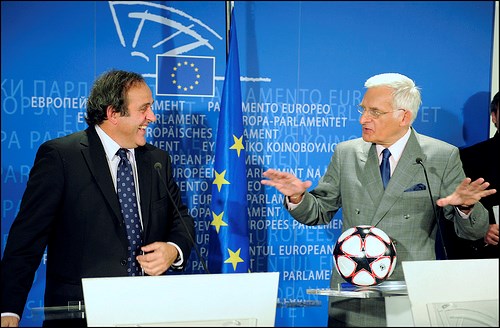Financial Stability Coming to Football?

UEFA President Michel Platini (pictured left) believes the Financial Fair Play Regulations are key to the future of football. Photo (c) flickr user European Parliament and used under a Creative Commons 2.0 licence.
07.06.2010
By Anton CapriaUnited Kingdom government poised to step in
The UK government has recognized this growing problem and looks set to try and find a solution. As of March 2010 plans were said to being constructed by the centre-left Labour Party. The legislation is rumored to force club ownership to give up as much as 25% of ownership to supporters’ trusts. In principle, the legislation would aim to create financial stability and maintain a strong link with clubs’ supporters.
President of UEFA Michel Platini is a supporter of the legislation. He went on record saying, “Personally, I think it is a great idea… that the supporters invest in a club because they, at the end of the day, defend the clubs identity. They are always there. They are always watching the games”. A vested interest of this nature by the fans could only be beneficial to clubs who are continuously accumulating debt.
While the English Premier League’s (EPL) teams are definitely the worst offenders they are by no means the only culprits in professional football. In Europe the EPL’s debt, according to UEFA, “represents 56% of the total owed by all the clubs in the leading divisions in Europe”. This still means that between the likes of Spain’s La Liga, Italy’s Serie A, Germany’s Bundesliga 1 and France’s Ligue 1 an incredible sum of debt has also been amassed.
UEFA steps in
UEFA, Europe’s football governing body, has also recognized the need for something to be done to curb the trend of debt accumulation. Taking it a step further than the rumored creation of financial legislation for football in the UK, UEFA has actually passed new UEFA Club Licensing and Financial Fair Play Regulations. The main pillars of the new regulations are:
- Break-even requirement: clubs must not spend more than they generate over a period of time
- No overdues payable during the season (towards other clubs, employees and/or social/tax authorities)
- Provision of future financial information: to ensure clubs can meet their future obligations
The regulations will be phased in over a period of three years. Intentions, according to UEFA are that all the regulations will “improve the financial fairness in European competitions and the long-term stability of club football across Europe”. The cornerstone of the regulations is the so-called “break-even rule”, essentially limiting clubs to spending no more than the revenue that they bring in. However, any money spent on infrastructure will not be counted as spending by the club. This will forcibly commit clubs to enhancing the long-term stability and growth of the club because clubs will have incentive to invest in youth development programs, as well as facility improvements.
Improvement in these areas will strengthen the core of the organizations and spree spending in short term acquisitions will be less than necessary. This is because with the break-even rule less money will be available for the transfer market. Instead building a strong youth scouting and development program will have a bigger role in dictating the success of a club.
Support from ruling bodies
The good news is that the ruling bodies of football leagues across Europe have given high praise to the new regulations that have been passed. Both The FA and the Premier League are “fully supportive of the principle of sustainability and of football clubs living within their means” read a joint statement by the two organizations.
Currently, according to UEFA, the Bundesliga is one of the few European leagues where “nearly all the clubs are operating on a profitable and rational basis”. Bayern München CEO, Karl-Heinz Rummenigge was very satisfied with the progress made. When commenting on the initial plan for a formal proposition of Financial Fair Play Regulations, he stated he believes that the regulations will accomplish what they set out too and that “for the sake of the game, and the European club tournaments in particular, I think we have to return to a more level playing field”.
What’s at stake
Clubs across Europe have the incentive to follow these new regulations for more than just their own financial stability. UEFA made sure that clubs will be forced to abide by these rules or they risk their inclusion in extremely profitable tournaments.
Officials within UEFA have made it clear that penalties will be assessed on a case-by-case basis but that it should not be taken lightly. Clubs found to be extremely delinquent in their following of the break-even rule will be held from admittance in to huge money makers like the Champions League, for example.
The plans definitely give clubs as well as football across Europe a brighter long-term future. However, Financial Fair Play is not the end all, be all solution to curb debt for football clubs. More solutions must be explored on European and individual country levels to help football gain sustainability. The talks in the UK are a sign that governments are starting to take notice but in order for football to benefit, those talks have to turn into active legislation.





